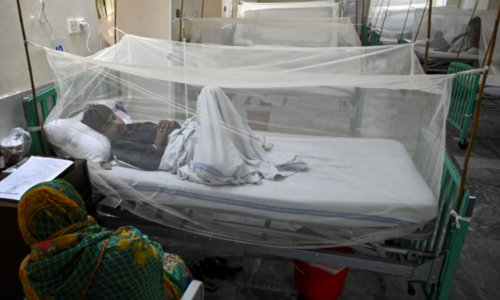KARACHI: As dengue fever claimed another life on Friday, the total number of cases from the mosquito-borne infection crossed over 6,000 mark in the metropolis in September.
According to a health department official, a male patient from Korangi died at a private hospital due to dengue fever.
Official figures show that 74 per cent of the total 9,826 dengue fever cases reported so far in Sindh were recorded in September, which has also proven to be the deadliest month in terms of dengue mortalities this year.
According to data, of the 6,053 confirmed cases in Karachi division, 1,980 were reported from district East followed by 1,368 from Central; 1,112 from Korangi; 846 from South; 369 from Malir; 192 from Keamari and 186 cases were reported from district West.
Another man dies of mosquito-borne infection in city; expert says outbreak has hit all areas and segments of society
According to sources, the viral disease has claimed 39 lives in the province over the past few months. Of them, 36 people have died in Karachi alone. Most of these deaths were reported in September.
Last year, 17 deaths from the infection were reported in Sindh while 2019 witnessed 46 mortalities. Three patients, the health department data showed, died of dengue fever in 2020.
Speaking to Dawn, health experts said there was persistent pressure on city’s hospitals as there was no let-up in the number of dengue fever cases.
“We have seen a gradual increase in the number of dengue cases being detected at the university’s central laboratory over the past four months. This trend is likely to go up and attain a peak by mid-October,” shared Dr Saeed Khan, a professor of molecular pathology heading the Sindh Public Health Lab at the Dow University of Health Sciences (DUHS).
However, he pointed out, weather conditions would play a crucial role in bringing the numbers down. “Early arrival of cold dry weather would definitely help in improving the situation. The month of December would see a significant reduction in the number of dengue fever cases.”
According to Dr Khan, patients who have been earlier infected with the disease are more vulnerable to illness severity in case of second infection from another serotype.
“There are four distinct, but closely related, serotypes of the virus that cause dengue. Recovery from infection is believed to provide lifelong immunity against that serotype. In our country, serotype-2 is more prevalent. Antibodies developed in the first dengue attack facilitated infection from the other serotype,” he said.
Currently, out of a total of 147 admissions at the Sindh Infectious Disease Hospital and Research Centre (SIDHRC), 70 are dengue and 15 are malaria patients. The dengue fever admissions at the hospital jumped from 150 to 300 in September.
“We have one death from dengue fever so far. The 10-year-old girl was brought to us in critical condition and remained on the ventilator for at least three to four days,” said Dr Abdul Wahid Rajput, Medical Superintendent of the SIDHRC.
Around 90 per cent of the patients recovered without any serious complications and blood transfusion was required in less than 10pc cases, he added.
Dr Rajput hoped that cases would likely go down in October as there was no likelihood of rain and water was being drained out in different areas.
According to Dr Rafiq Khanani, the president of the Infectious Diseases Society of Pakistan, this year dengue’s outbreak affected all areas and segments of society in Karachi.
“Earlier, we used to see concentration of cases in few towns. But, this year the disease has gripped the entire city and hospitals have run out of beds,” he said, adding that the wide impact of the outbreak had much to do with city’s poor sanitary conditions and poor eating habits.
Published in Dawn, October 1st, 2022













































